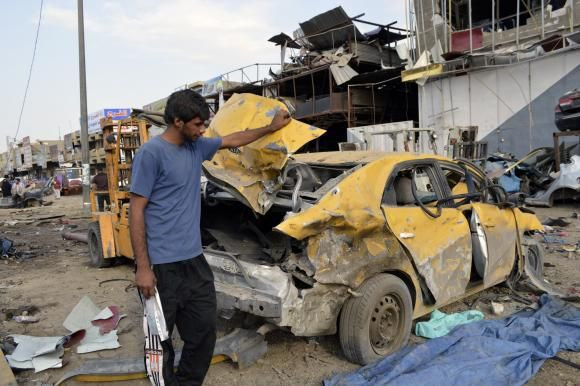At Least 47 Killed In Attacks In And Around Baghdad

(Reuters) - Bombings and a mortar strike in Shi'ite Muslim parts of Baghdad and in the rural belt south of the capital killed at least 47 people on Thursday and wounded 123, police and medical officials said.
An Iraqi Shi'ite political figure said the assaults, part of a surge of violence in Shi'ite neighbourhoods in recent weeks, were revenge attacks by the Sunni Muslim militant group Islamic State, which has seized control of much of northern Iraq.
The al Qaeda offshoot has been battling Shi'ite militias and soldiers loyal to Iraq's Shi'ite-led government as it attempts to establish a caliphate straddling Iraq and neighbouring Syria, where it has also captured swathes of territory.
A suicide car bomb hit an army checkpoint near a restaurant in Baghdad's northern district of Talibiya at 2:30 p.m. (1130 GMT), killing nine people, officials said. Forty-five minutes later, a pair of car bombs exploded in the district of al-Dawlai in western Baghdad, killing 16 people and wounding 35.
Minutes after that, five mortar rounds hit the neighbouring Shi'ite district of al-Shaoula, killing another five and wounding 21 others. A car bomb then exploded in the nearby Hurriya district, leaving six dead and wounding 14 others. Three people also died and six were wounded in a bomb blast by a row of coffee shops in the Shi'ite working class district of Allawi.
The violence also reached the countryside south of Baghdad, a mixed area that is often a battlefront in the war between Sunni jihadists and the Shi'ite-led government.
In the district of Mahmudiyah, a car bomb killed six and wounded 18, while a bomb blast claimed the lives of three Iraqi soldiers and wounded one other on patrol in Madain.
"They (Islamic State) are making a statement to the Shi'ites fighting them ... We can target you in your household," said Kareem al-Noori, from the Badr Organisation, a powerful Shi'ite political party with a militia wing.
There was a relative lull in violence in Baghdad after Islamic State seized Iraq's second city, Mosul, and much of the north in June and threatened to march on the capital.
But since late September, violence in the city has increased again. Prime Minister Haider al-Abadi, in office for a month and still without a defence or interior minister due to rifts between the main Shi'ite and Sunni political parties, on Wednesday sought to soothe jangled nerves.
"Baghdad is safe and the vicious terrorists cannot and will not reach it," Abadi said in a televised speech at a military ceremony.
"Our brave security forces have managed to secure Baghdad and its perimeter."
© Copyright IBTimes 2024. All rights reserved.





















